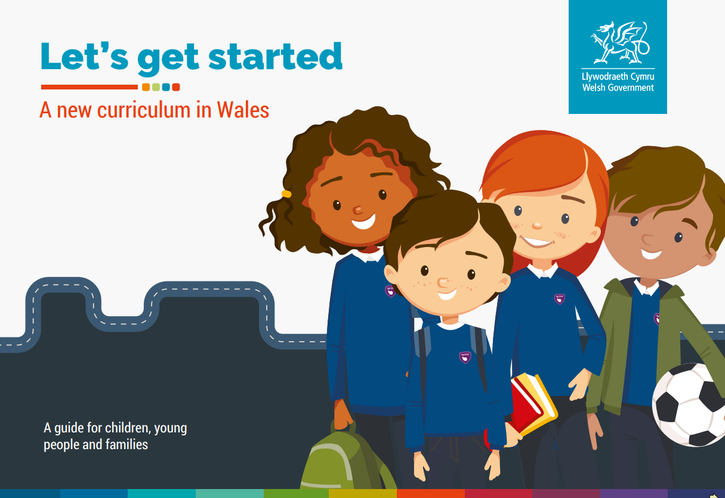
St Joseph's R.C. Primary School
Curriculum for Wales
Four Core Purposes
St Joseph's Curriculum for Wales Statement
Curriculum Statement.
In line with our mission and vision statements we follow the Curriculum for Wales with the children of St Joseph’s R.C Primary. Our curriculum continues to place Christ at the centre of all we do.
At Joseph’s R.C Primary, we are inspired by the Spirit of Christ, and strive to build on our strengths and seek ways in which we can enrich every child’s experiences and achievements through our positive and caring ethos, rooted in Gospel Values.
We endeavour to provide the best and most memorable learning experiences to help the children we serve achieve their potential and aspire to ever greater heights:
- to give them skills to build on, and expand their knowledge and understanding to become ethical citizens of a rapidly changing world;
- to prepare them for life in Wales, Britain and the global society beyond:
- to inspire a lifelong love of learning;
- to foster in them imagination, independence, confidence and resilience to deal with life in a positive, healthy and productive way:
- to help them grow and learn together in their love of God.
The curriculum has been developed by the whole school team. Our aim is to provide an inclusive, broad, balanced and challenging curriculum that nurtures the needs of each pupil. The curriculum provides each pupil with an education to be able to develop into independent learners relevant to the modern world.
With the four purposes at the heart of all we do. We aim to:
- Foster positive attitudes to learning, to encourage ambitious, capable learners with high aspirations and resilience in their learning.
- Emphasise the importance of how to live a healthy life with the confidence to manage their physical and emotional wellbeing.
- Develop ethically informed young citizens in Wales and the wider world.
- Provide opportunities for pupils to show creativity and enterprise to acquire knowledge and skills relevant to life and work in a fast-changing world.
- Ensure that we listen to the ‘pupil voice’ and it is used to determine the direction of their learning and to engage and excite them in their learning
At the initial stages on our journey, in order to develop a bespoke curriculum, we engaged with the whole school community. This informed us of what all stakeholders thought was important in the children’s education.
The curriculum gives due consideration to all of the mandatory elements. It is broad and balanced and includes learning opportunities within and across all of the areas of learning and experience. It encompasses the concepts in all of the statements of what matters. Our curriculum takes account of each learner’s additional learning needs (if any).
We are building our curriculum to ensure progression of knowledge, skills and experiences.
Our children are assessed throughout their journey through school. Assessments are embedded in day-to-day practice to ensure that each child’s next steps are carefully considered and identified. Formal assessments and the national personalised assessments are also used to track progress and identify areas for support. We also work with the cluster schools to further develop a shared understanding of progression and transition planning.
Our curriculum considers the mandatory requirements of teaching Welsh, English, Religion, Values and Ethics (RVE), Relationship and Sexuality Education (RSE) and the cross curricular skills of literacy, numeracy and digital competence.
Our curriculum is integrating in approach and our planning provides opportunities for children to develop in the six areas of learning and experience.
These are:
Language, Literacy and Communication
Maths and Numeracy
Health and Well-being
Humanities
Expressive Arts
Science and Technology
Our school ensures a focus on emotional and mental wellbeing through its work on Thrive and ELSA as well as considering the impact on learners’ mental health and emotional well-being in all curriculum decision making.
We want to ensure every child is prepared and equipped for life. Whilst at Josephs we endeavour to encourage aspiration for the future of every child.
Curriculum for Wales
This is an exciting time for the young people of Wales. A new Curriculum for Wales is coming that will enthuse learners from 3 to 16, giving them the foundations they need to succeed in a changing world.
Our national mission in Wales is to raise standards, raise the attainment of all children and ensure we have an education system that is a source of national pride and public confidence.
Minister for Education.

The new curriculum in Wales will have more emphasis on equipping young people for life. It will build their ability to learn new skills and apply their subject knowledge more positively and creatively. As the world changes, they will be more able to adapt positively.
They will also develop a deeper understanding of how to thrive in an increasingly digital world. A new digital competence framework introduces digital skills across the curriculum, preparing them for the opportunities and risks that an online world presents.
Teachers will have more freedom to teach in ways they feel will have the best outcomes for their learners.
The central focus of assessment arrangements will be to ensure learners understand how they are performing and what they need to do next. There will be a renewed emphasis on assessment for learning as an essential and integral feature of learning and teaching.
The purpose of the new curriculum is to support our children and young people to be:
- ambitious, capable learners, ready to learn throughout their lives
- enterprising, creative contributors, ready to play a full part in life and work
- ethical, informed citizens of Wales and the world
- healthy, confident individuals, ready to lead fulfilling lives as valued members of society.
It will have six ‘Areas of Learning and Experience (AoLE).
- Expressive arts.
- Health and well-being.
- Humanities (including RE which should remain compulsory to age 16).
- Languages, literacy and communication (including Welsh, which should remain compulsory to age 16, and modern foreign languages).
- Mathematics and numeracy.
- Science and technology.
St Joseph’s Primary School is a Catholic School and as such, Religion will continue to be a core subject. The Gospel values and the mission of Jesus underpin everything that we do. At present, we follow the “Come and See” scheme of work.
Relationships and Sexuality Education: RSE will be mandatory in all maintained schools, including primary schools. Parents will no longer be allowed to withdraw their children from these lessons.
The focus will be on building relationships based on mutual trust, and developing mental and emotional wellbeing, resilience and empathy.
The Welsh government will issue guidance to schools on how to provide RSE that is age-appropriate and relevant to pupils’ developmental stage, but it will give schools the flexibility to design their own programme of teaching that reflects diversity and difference in relationships, sex, gender and sexuality.
The new curriculum will also include three cross-curricular responsibilities: literacy, numeracy and digital competence.
Why it is changing?
Now more than ever, young people need to be adaptable to change, capable of learning new skills throughout life and equipped to cope with new life scenarios.
Advances in technology and globalisation have transformed the way we live and work. These changes have profound implications for what, and how, children and young people need to learn. After all, tablets and smart phones didn’t even exist when the last curriculum was introduced in 1993.
Schools and teachers need more flexibility to respond to this environment, using a new curriculum which will promote high achievement and engage the interest of all children and young people to help them reach their potential.
The new curriculum will bring this about by making learning more authentic and experience-based, the assessment of progress more developmental, and by giving teachers the flexibility to deliver in more creative ways that suit the learners they teach.
The Digital Competence Framework
The framework introduces and develops the skills needed to live and work in an increasingly online and digital world, ranging from communicating and collaborating to problem solving and handling online bullying.
Like literacy and numeracy it applies across all subjects, developing skills and confidence in learners that make them adaptable to changes in technology over time. The framework has four strands of equal importance. Each has a number of elements which explore the detail within it.
The strands are:
- Citizenship – which includes the elements of ‘Identity, image and reputation’, ‘Health and well-being’, ‘Digital rights, licensing and ownership’, and ‘Online behaviour and cyberbullying’
- Interacting and collaborating – which includes the elements of ‘Communication’, ‘Collaboration’, and ‘Storing and sharing’
- Producing – which includes the elements of ‘Planning, sourcing and searching’, ‘Creating’, and ‘Evaluating and improving’
Data and computational thinking – which includes the elements of ‘Problem solving and modelling’, and ‘Data and information literacy’